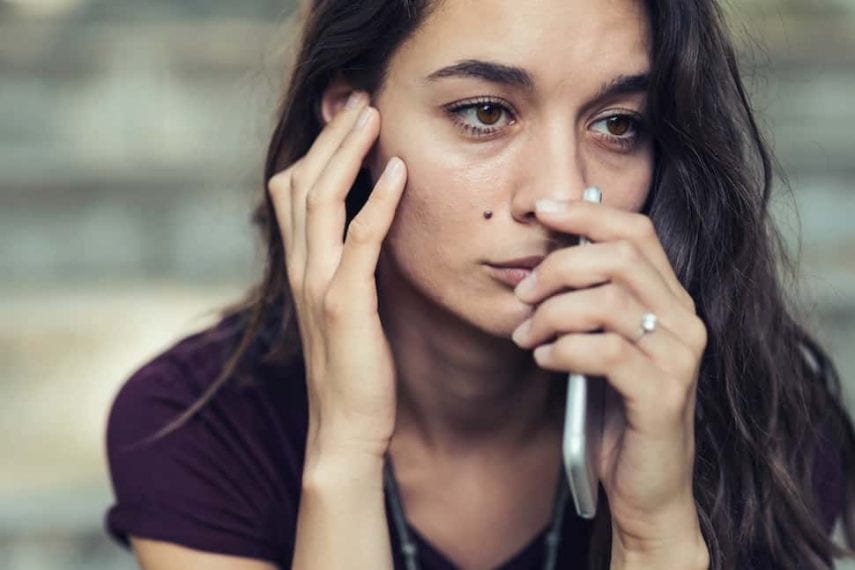Social Media and Depression

Social media-triggered depression is a real phenomenon. With the rapid growth in social media sites and engagement, mental health researchers have investigated how time spent online may trigger mental illness. The evidence clearly shows that more social media use, and specifically certain negative behaviors on these sites, is connected to and may even cause depression. Treatment can help, as can limiting time spent engaging with social media.
There are many ways that social media can enhance your life. For instance, you may reconnect with an old friend from high school or be able to see updates from family living too far away to see often. But, there is a dark side to social media, too. Comparing yourself to others, seeing unflattering photos of yourself, or feeling as if you are being left out by friends are all negative social media behaviors that can trigger or worsen depression. There is a proven link between social media and depression, and while totally cutting out these sites may be unrealistic, there are changes you can make to get relief.
Social media sites and use of them is a modern phenomenon. As recently as 2008, just 10 percent of Americans had a social media profile. In 2019, that number has risen to 79 percent. Around the world, social media users number nearly 3.5 billion, and this number keeps rising by about nine percent every year.
Because use of social media is so widespread, it is important to understand the impact. The internet and social media have changed the way we do many things, but more important may be how they have affected our mental health. There is a real and significant link between using social media sites and experiencing depression.
A Connection Between Depression and Social Media Use
Researchers studying mental health and internet use have uncovered a definite connection between using social media and experiencing depression. Several studies back up this link and prove that, although there may be no perfect explanation for it, there is a connection.
A study conducted in 2014 and published in 2016 found a link between social media and both depression and anxiety. The researchers surveyed about 1,700 people between the ages of 19 and 32. They found that social media use increased the risk of depression. The correlation was very strong and included anxiety symptoms as well.
There are many other studies with similar findings. Many of them focus on young people, the primary users of social media. But no one is immune to the potential negative effects. Teens, young adults, and anyone else may exhibit depression in connection with more social media use.
Does Social Media Actually Cause Depression?
Many experts would say it has not been proven that the use of social media sites causes depression, but the strong link indicates that it is at least a contributing factor. It may be that people already predisposed to depression are triggered by social media use. It’s also possible that someone struggling with depression will turn to social media and use these sites in ways that are unhealthy and exacerbate negative feelings.
The researchers involved in a study published at the end of 2108 claim that they have proven a causal link. In other words, they say that not only is there a connection between depression and social media, but social media use is at least one factor that causes this mental illness.
In the study, they involved 143 college students. These participants were assigned randomly to one of two groups: one kept using social media as normal and the other limited social media use to 30 minutes a day. The group forced to be on social media sites less had significantly better mental health measures at the end of three weeks.
All the students underwent baseline mental health evaluations before the study began. At the end, the restricted group experienced big declines in depression and loneliness. The biggest improvements were seen in those participants who had higher levels of depression at the beginning. The researchers insist that these results prove social media causes depression by the fact that using it less provided relief.
How Does Social Media Use Cause Depression?
What is certain is that there is a connection, and it is probable there are several ways in which social media use can trigger bad feelings, contribute to depression, or even be a cause. Some of the possible explanations include:
- Social Comparison. A study of over 500 social media users found that the people who met the criteria for depression were more likely than others to engage in negative behaviors on social media. These included making comparisons to other people and feeling “less than” or “worse off.”
- Poor Self-Image. The same study found another negative behavior common in social media users with depressive symptoms: showing concern about tagged pictures. These people worried about looking bad in photos and were less likely than others to post pictures of themselves with friends.
- Loneliness and Isolation. Loneliness is a feeling often reported by people who have depressive symptoms and use social media. Although these sites are supposed to increase connections, using social media too much may actually increase isolation and feelings of being alone.
- FOMO. Another important and negative feeling that social media can trigger that may contribute to depression is FOMO, or the fear of missing out. You may see your friends doing things that make you feel jealous or that you worry you were not invited to.
Call for a Free Confidential Assessment.
877-727-4343Clinical Signs of Depression – Is Social Media Affecting You?
Awareness is important for good mental health. You may not realize how much social media is having an effect. Know the signs of depression that mental health professionals look for to make a diagnosis. Are you experiencing any of these regularly? Do they seem to be connected to your time on social media? If the answers are yes, you may want to consider seeking professional help or at least beginning to limit your use of social media.
You may receive a diagnosis of major depression if you have at least five of these symptoms that persist for two weeks or longer:
- A depressed mood, with feelings of sadness or hopelessness
- Loss of interest in other activities you used to enjoy
- Changes in your appetite or weight
- Changes in sleep patterns, either insomnia or sleeping more than normal
- Fatigue
- Feeling worthless
- Difficulty thinking, concentrating, or making decisions
- Agitated or slowed down movements
- Thoughts about death and suicide
Keep in mind that you can still seek help even if you don’t think you meet all the criteria for depression. You may be wrong, but even if you don’t get a diagnosis your symptoms may worsen and treatment can provide relief.
Treating and Managing Depression
The connection between depression and social media is real, but it doesn’t necessarily mean you have to go cold turkey and cut Facebook and Instagram out of your life entirely. The first, most important step you can take if you are feeling down is to get a professional mental health evaluation. If you are diagnosed with depression, or even if you don’t fully meet the criteria, there are treatment programs available to help manage and shift your negative feelings.
Limiting social media should certainly be a part of the overall strategy to manage depression. Also important is changing negative behaviors online. If arguments with friends over politics leave you feeling glum after being on Facebook, for instance, restrict yourself to interactions on other subjects only.
Making positive behavior changes, online or in any situation, is challenging. An experienced behavioral therapist who works with people struggling with depression can guide you. Behavioral therapy is all about accepting and processing negative feelings and taking active steps to make positive changes in your life.
If you feel troubled by your social media use; if you feel worse after being on these sites; and if your feelings of depression are persistent and even get worse, it’s time to reach out for help. Professional treatment centers can evaluate you, plan a treatment program, and help you learn to live better with social media.
Bridges to Recovery offers comprehensive treatment for people struggling with mental health disorders as well as co-occurring substance use disorders. Contact us to learn more about our renowned Los Angeles programs and how we can help you or your loved one start on the path to lasting wellness.






